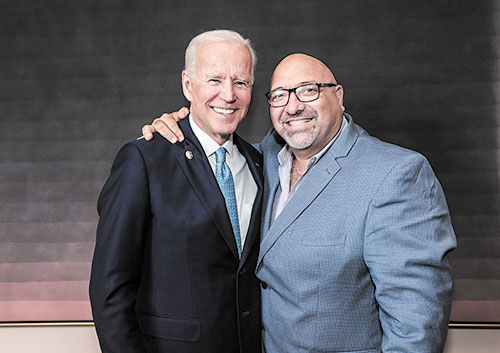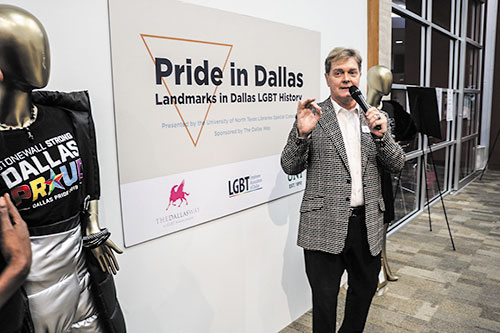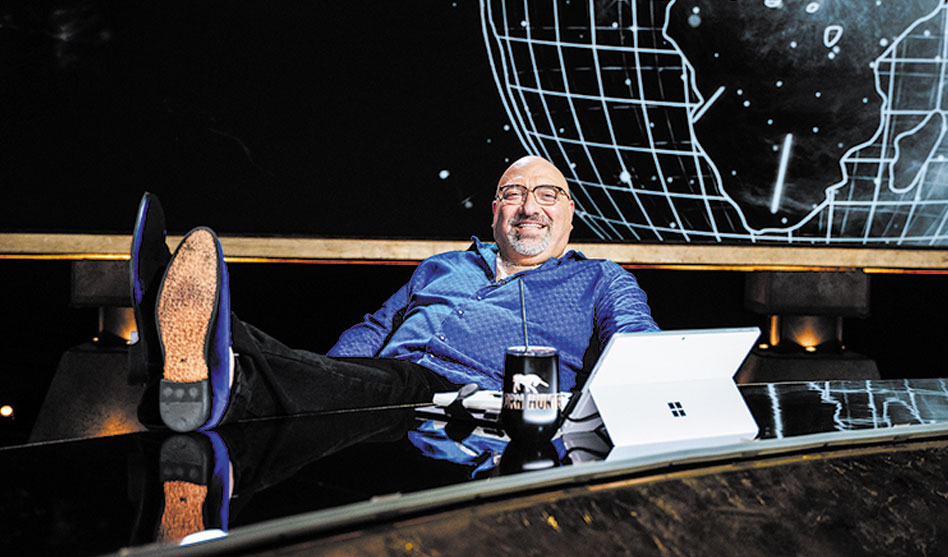Moe Vela on the Unicorn Hunters set
Moe Vela: History includes the challenges, obstacles pain and struggles, not just the highlights
DAVID TAFFET | Senior Staff Writer
taffet@dallasvoice.com
Don’t expect to hear about his time at the White House when Moe Vela speaks at the Queer History South: Archives for All, Y’all conference in Dallas this weekend. And he won’t be focusing on his Amazon Prime TV show Unicorn Hunters, which is in production for another season.
Instead, Vela said, he’ll tell the story behind the story — how he grew up in the Rio Grande Valley without having the safety and security of a neighborhood like Oak Lawn.
“We usually view someone’s successes, accolades and accomplishments to define a person,” Vela said.

Moe Vela with then-presidential candidate Joe Biden in 2020
But to learn from history, we need to know more than what was accomplished. We need to learn the details, the challenges, the obstacles and the pain and struggles behind the successes to truly learn from our past, he said.
That’s what he’ll focus on when he’s in Dallas for the 13-state LGBTQ history conference at Dallas College/El Centro from Sept. 30-Oct. 2.
To get a full and fair understanding of LGBTQ history, Vela said he likes to focus on more than history’s highlights. Most people think of Stonewall and then a series of court decisions when they think of the steps to LGBTQ equality. But, he said, it was the individual stories behind each of these milestones that made them happen.
Vela holds a place in LGBTQ history himself as the first LGBTQ American and the first Hispanic American to serve in a senior executive role in the White House in two administrations — first working for Vice President Al Gore during the Clinton administration and then working for Vice President Joe Biden during the Obama administration.
He was appointed to his first senior White House role when he was in his 30s. How did he get there so young? “Everything is about relationships,” he said.
Having been born into a family with a legacy of service, Vela got a job with the Department of Agriculture in Washington, D.C.
“I was out drinking at a microbrewery with a number of other political appointees,” he said. “The director of White House operations said, ‘My Aunt Patsy’s office said they’re looking for a lawyer-type.’”
Vela said he happened to have had a few drinks at the time, and so he piped up, commenting that he was himself a lawyer-type. So she said, “Send me your resume.” He heard back promptly, was interviewed and got the job working for Gore.
And Vela did a great job of hiring staff. His chief of staff was Ron Klain, who now serves as chief of staff to President Biden.
From the onset, Vela said, both Gore and Biden were on the side of equality. Obviously, both had LGBTQ friends and understood the issues. But he explained how he made himself a valuable advisor on LGBTQ issues and used marriage equality as an example.
“The Bidens were passionate about marriage equality,” he said. “They were there ethically, spiritually, mentally.”
In fact, Vela said, they were ahead of the Obamas on the issue. “Personally, I wanted to tell them, ‘Oh, just say it.’” he said.
But Vela put his own self-interest aside and counseled respect and deference to the president and First Lady. He also understood that we were winning one marriage equality lawsuit after another, and each judge’s ruling added another interesting argument. In the long run, it was politically helpful to let these cases play out.
So understanding their role in the office of the vice president and thinking in context of history and progress, he advised the Bidens against making a statement earlier and getting out in front of the Obamas. Biden accepted the advice until, in response to a question, he came out in favor of marriage equality, prompting Obama to make his own pro-marriage equality statement within days.
As an advisor on Hispanic issues, Vela gave the example of immigration as another sensitive issue.
“Immigration is a very divisive issue,” he said, “a confluence of morality, legality, policy and politics.”
He said Democrats make a mistake by not acknowledging it’s illegal to enter the country without documentation.
“It’s about messaging,” he said. “We have to be supportive from a humanitarian perspective, but we can’t ignore the law. [Support seeking] asylum through the proper channels and system put in place.”
If that system isn’t working, he added, then let’s fix it.
Vela said that while the GOP likes to accuse Democrats of supporting open borders, “more people have been turned away and deported this year under Biden than ever. We’re not soft on the issue.”
The trick is to find a balance. “Treat [undocumented immigrants] with kindness and respect,” he said.
“Tell them, ‘Let’s show you how to apply for asylum.’ Treat them the way we’d want to be treated.”
And even if it’s determined the person can’t stay in this country, he added, they should be “deported with dignity. … Let’s get to the root of the problem.”
Vela listed several reasons people leave their homes to come to the U.S. One of the main reasons is lack of available jobs. So one of the first things the U.S. should be doing is helping to create jobs in their home countries. “Help [those countries] empower their people so they don’t need to leave,” he said.
The second main driver of immigration is people being tormented in their home countries by the drug cartels. Noting that the U.S. is the number one buyer of drugs, Vela said, “If we cut off the demand, the supply would no longer be needed. We’re part of the problem.”
He said the U.S. must also address the climate change that’s fueling some immigration. He suggested teaching these countries to “enter the clean energy world,” by helping them create wind and solar power.
On trans issues, Vela declared, “Gay men have no idea what it means to be trans.” He said as a gay man, he can be supportive from an equality standpoint, comparing it to the issue of domestic violence.
“You don’t have to experience it to be supportive,” he said. “I wasn’t able to be who I was for the first 18 or 19 years of my life. Authenticity and living truth is very important to me.”
Vela talked briefly about his current career as a creator and panelist, along with Steve Wozniak and Lance Bass, of Unicorn Hunters, a show he describes as Shark Tank on steroids that allows the audience to participate in the investments. But then he pivoted back to the conference in Dallas and its focus on LGBTQ history, describing himself part of the AIDS generation. That generation, he said, includes more perspectives than just that of ACT UP founder Larry Kramer.
Vela promised to share with conference attendees that bit of Texas and Southern gay history, but, he stressed, “My story wasn’t any more special or more challenging than anyone else’s as part of history. So we can affirm each other.”
Hear Vela tell his own story at Archives for All, Y’All at Dallas College/El Centro on Friday.
……………………………..
Queer History South comes to Dallas

Archives for All, Y’All features speakers who’ve been collecting, archiving, teaching and exhibiting LGBTQ history
DAVID TAFFET | Senior Staff Writer
taffet@dallasvoice.com
LGBTQ history is more than Stonewall. It’s stories of LGBTQ lives from cities across the country. And it is on display this weekend in Dallas as the Queer History South conference comes to town.
Queer History South is a network of community members from across a 13-state area who share best practices for those collecting LGBTQ histories, archives, exhibits, historical research and education. The organization holds its second — and pandemic-delayed — conference, dubbed Archives for All, Y’All, in Dallas this weekend, Sept. 30-Oct.2.
The conference is of interest to archivists, historians, librarians, faculty, students, educators, nonprofit employees and community members working to preserve their community’s narratives. Moe Vela (see accompanying story) is the opening plenary speaker on Friday at 9 a.m.
The Dallas Way is the principle collector of LGBTQ artifacts and stories in the DFW area. Robert Emery will present a workshop on Outrageous Oral, The Dallas Way’s speaker series that has included presentations by more than 100 community leaders.
Other local history organizations will also present, including Invisible Histories of the South based in Birmingham, Ala., and founder of Queer History South, and The Austin LGBTQ+ Oral History Project at University of Texas. A presenter from the LGBT+ Archives Project of Louisiana will discuss dealing with incomplete archives sometimes caused by state officials who destroyed or redacted incriminating documents.
On Friday night, attendees will visit the first and only LGBTQ historical marker in Texas, which stands on Cedar Springs Road, and then they will check out the world’s largest LGBTQ cowboy dance hall — The Round-Up Saloon. Others may take the Green Line to Fair Park for the opening day of the State Fair of Texas.
Mandy Carter is the opening plenary speaker on Saturday. She is the co-founder of Southerners on New Ground, the National Black Justice Coalition and Equality North Carolina. Her papers are archived at Duke University Libraries.
Speakers from the LGBTQ History Museum of Central Florida and the associate curator of education and outreach from the Orlando Museum of Art will discuss their work cruising for gay history outside the bars. In the afternoon, three speakers from University of North Texas will talk about the school’s physical and digital archives, research and preservation of North Texas LGBTQ history.
The conference continues Saturday with a reception at the nearby Dallas Holocaust and Human Rights Museum, with a special presentation on the museum’s LGBTQ exhibit. The bar at the museum opens at 6:39 p.m., two minutes after sunset signals the end of Shabbat.
The conference takes place at Dallas College/El Centro, 801 Main St. For more information, visit InvisibleHistory.org/qhs.

